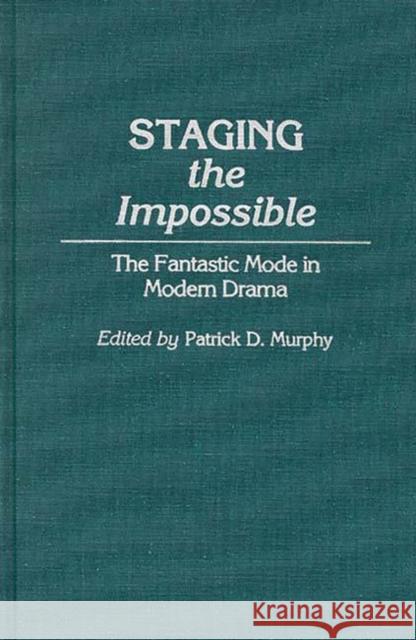Staging the Impossible: The Fantastic Mode in Modern Drama » książka
Staging the Impossible: The Fantastic Mode in Modern Drama
ISBN-13: 9780313272707 / Angielski / Twarda / 1992 / 256 str.
"Staging the Impossible" explores the most recent critical thinking on the relationship between the literary mode of the fantastic and the literary genre of drama with respect to modern theatre. While a few monographs treat a particular dimension of the fantastic in drama, the Gothic or the fairy tale for instance, no other volume provides a critically sophisticated introduction to the diversity of fantastic drama written and performed in this century. The essays here lay to rest the illusion that realism is the only genuine form of theatrical expression and the notion that cinema special effects have rendered science fiction and the stage incompatible. Competing with the realism of the first half of the twentieth century and the new realism of the second half have been a range of successful theatrical repertoire, including the absurd, the horrific, the supernatural, the mythic, the dream-vision quest, the postmodern, the hyper-realistic, and the science fictional.
Wide ranging in time and space, this volume comprises fourteen essays on the fantastic on the modern stage, assessing dramatic works from the United States, Ireland, England, Western Europe, and the Caribbean. Canonical figures, such as Strindberg, Yeats, Beckett, Ionesco, Cocteau, and Stoppard are studied, along with neglected figures, such as Wassily Kandinsky, better known as an expressionist painter, and Halper Leivick, author of the Yiddish play "The Golem," and innovative new performance troupes and individual artists, such as Squat Theatre and Spalding Gray. Concluding essays are devoted to contemporary experimental theatre and postmodern drama. A study of science fiction on stage includes an annotated listing of forty English-language plays. Concerned with the interstice of theatre and the fantastic, this work will be valuable to students and scholars of both, of genre studies, and of contemporary literature in general.











